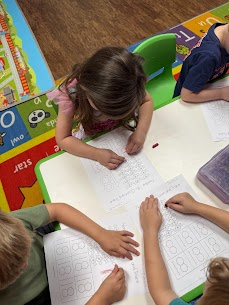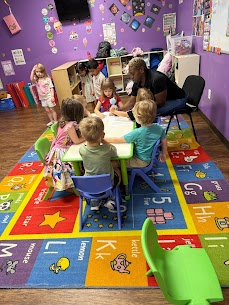Why Early Childhood Education Programs Matter
At Tiny People University, we believe childhood is more than just cute crafts and snack time (though we’re big fans of both!). It’s also a season full of big feelings, even bigger milestones, and a whole lot of learning—most of it happening before formal education in kindergarten ever begins.
If you’re wondering whether early childhood education is really that important, the answer is a big, enthusiastic yes. And we’re here to walk you through why early childhood education is important and the benefits of early education.
What is Early Childhood Education?

Early childhood education is everything your little one learns from birth to age five. That might sound simple—but this stage is huge when it comes to brain development. Neural connections form at an insane rate during this time. In fact, a child’s brain is already 80% of the size of an adult brain by age 3. Wild, right?
In short, this is a super important time during brain development when children build the foundation for thinking, language, emotional skills, and more. It’s the time when playing peek-a-boo, singing songs, and chatting about colors actually sparks important neural connections. The learning is real—even if it feels like play.
Benefits of Early Childhood Eduction
Early childhood education programs do so much more than teach ABCs and 123s. They help children become learners—curious, confident, and ready to explore the world around them.
Academic Readiness and Socialization
We already know that children’s brains are developing at lightning speed in the early years—and the right environment helps that growth take root. From language and literacy to fine motor and social skills, high-quality early childhood education programs provide daily opportunities to build knowledge through play, conversation, and hands-on activities.
Research shows that kiddos who attend quality early education programs are better at problem-solving, communicating, and adapting to new situations. And just as important? They learn how to be with others—how to share, cooperate, take turns, and navigate all those tiny (but mighty) social moments that happen on the playground or in a group activity.
At Tiny People University, we focus on both sides of the coin: academic readiness and social-emotional growth. Because thriving in kindergarten means being ready in every way.
Emotional and Behavioral
At this age, children are learning how to handle big feelings, build independence, and navigate the ups and downs of daily life. That’s why having a safe, loving, and consistent environment is so important.
In a quality preschool setting, like Tiny People University, children learn important skills like self-regulation (that’s a fancy way of saying they’re learning how to manage those big emotions!). With gentle routines and caring guidance, kiddos discover how to take deep breaths when they’re frustrated, use their words when they need help, and bounce back from challenges with confidence.
Research shows that kids who build these emotional skills early on are more likely to thrive later in life—academically, socially, and even behaviorally. Many early childhood education programs in Texas, including ours, put a strong focus on social-emotional learning because we know that when children feel safe, seen, and supported, they shine. And there’s nothing more rewarding than watching a child grow into their best, most confident self.
Not sure if your little one is quite ready for preschool? Our blog on 5 Signs Your Child is Ready for Preschool can help you figure out if now is the right time to enroll.
Long-Term Benefits of Early Childhood Education
Choosing a quality daycare for your child is not just about finding a fun and safe place to spend their days—it’s about setting them up for lifelong success. One of the biggest long-term benefits of early childhood education is how it builds the foundation for future learning, both in and out of the classroom.
When children are introduced to learning in a way that feels joyful and engaging, they develop confidence, curiosity, and the kind of can-do attitude that helps them thrive as they grow. Studies show that children who attend high-quality early childhood programs are more likely to do well in school, graduate high school, and even go on to college or fulfilling careers. That early exposure to routines, problem-solving, and social-emotional skills makes a lasting impact.
At Tiny People University, we believe the importance of early childhood education is huge. It’s where lifelong learners are made—and where children start to believe in themselves. The benefits of early childhood education are more than academic—they’re emotional, social, and deeply personal. And that’s exactly why we do what we do.
How to Identify a Quality Program

We know choosing the right early childhood education program feels like a big decision (because it is!). You want a place that feels safe, supportive, and just right for your little one. So how do you know if a program is a great fit? Here are a few things to keep an eye out for.
Signs of a Well-Structured Program
A quality early education program should feel like a second home—warm, welcoming, and full of purpose. So how do you spot one? Look for:
- Consistent daily routines that give children a sense of comfort and security
- A balance of structured activities and free play, so kids can explore and learn at their own pace
- Clean, cheerful classrooms filled with books, toys, and learning materials that spark curiosity
- Friendly, nurturing teachers who take the time to get to know your child and cheer them on
At Tiny People University, we blend fun with intentional learning in every part of the day because when children feel safe and loved, they’re free to grow and shine in their own way and at their own pace.
If your child is still in the baby stage and a lot of the toddler talk feels far away, we’ve also put together A Parent’s Guide to Infant Daycare in Magnolia to help you feel confident when making those first big decisions.
Accreditation and Teacher Qualifications
While warmth and connection matter deeply, it’s also important to know the program is meeting professional standards. Accredited programs follow high-quality guidelines for health, safety, and education. There are lots of questions to ask when choosing a daycare in Magnolia. Here are a few:
- State licensing and/or national accreditation
- Teacher credentials
- Ongoing professional development for staff
- Low child-to-teacher ratios to support individual attention
At Tiny People University, our teachers are trained, passionate, and genuinely love what they do. We believe that early educators aren’t just caregivers, they’re an integral part of your child’s learning journey.
Ready to Experience the Benefits of Early Childhood Education in Magnolia, TX?
The early years fly by, and what your child learns now truly shapes who they become. From problem-solving to making friends, managing big emotions to falling in love with learning, the benefits of early childhood education last a lifetime.
At Tiny People University, we’re not just a daycare—we’re a place where tiny people grow into confident, capable learners who feel seen, safe, and celebrated. If you’re looking for a program that feels like family and prepares your child for a bright future, we’d love to meet you.Contact us today to schedule a tour. We can’t wait to welcome you into the Tiny People family!
